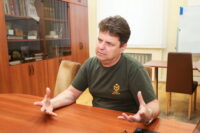
(opinion article)
Let’s imagine the situation: you have finally reached one of your main goals in life – you became an international journalist. Finally, something that you have dreamed of is now a reality. But what’s next? Is there something in particular you need to do?
There will always be some nuances here and there, just like in any other profession, so a person should always be ready. A number of experienced individuals call international journalism a “profession that transcends borders,” and that’s true. During your career life you will see how that works in practice, how much the “international” part really matters. The wider your audience is the more responsibility you have, since you should take into account mentalities of people from all sorts of cultural backgrounds.
To learn to speak another language/languages does not only give you an access to some new, previously unknown information, this ability also opens a lot more roads for communication with various people. You would also impress your editor, which is also very important.
There is a specific aspect, not a lot of people talk about, – do not be afraid to break some rules and be independent. Sometimes in order to get what you want, you have to be daring and not afraid to take action when it’s worth it, you just have to know the limits. This is where knowledge in journalistic ethics comes in handy.
Journalism as a profession has absorbed into its professional ethics many requirements for the ethics of other professions, for example, a journalist must be aware that he or she always educates others, so he must behave exemplary, just like a teacher. Therefore, journalists are subject to high moral requirements, which are additional regulators of their behavior. Journalistic ethics in Ukraine, for instance, include rules such as “Illegal receipt of material reward or any other benefit for completed or uncompleted journalistic material is incompatible with the title of journalist” or “No one should be discriminated for their gender, language, race, religion, national, regional or social origin or political opinion.”
No economic, political, ideological needs can justify the moral guilt of a journalist. It is necessary to understand not only economic or political processes, but also, eloquently speaking, spiritual aspects, to know and have moral principles in the heart. No one will ever trust a journalist, who screwed up, so one must always remain careful and be aware of their actions and how they affect the viewers or readers.
Without freedom of speech, the existence of a democratic society is impossible. However, the law may restrict freedom of expression in exceptional cases, provided that such a restriction can benefit society as a whole. And journalists, knowing where the limit of freedom of speech is, can operate freely, in accordance with the goals set, given the need to inform the society. This may sound like censorship or self-censorship, but keep in mind that even democracy needs to have limits and standards; otherwise chaos and anarchy will ensue.
In conclusion, when you become an international journalist, you will have to make sure to follow not only those rules, but try and stick to all of the existing regulations, as your future career, reputation and even personal life (as not a lot of people want to have anything to do with an unfair and corrupt individual.) will depend on these factors.
























































Залишити відповідь